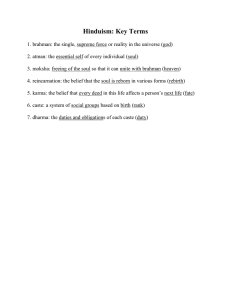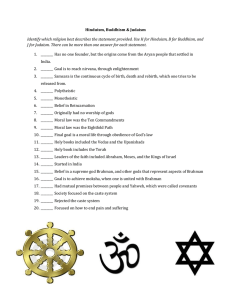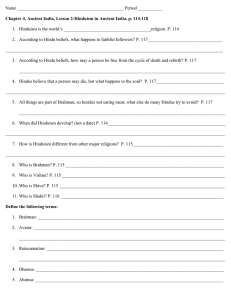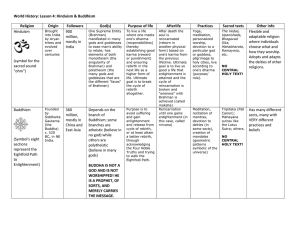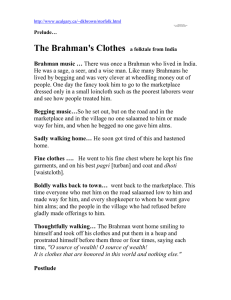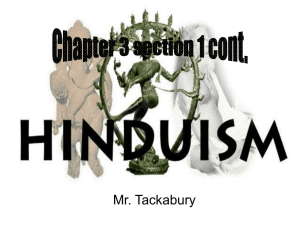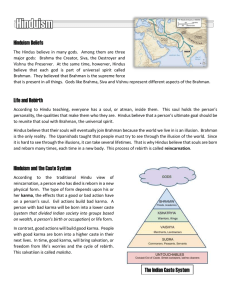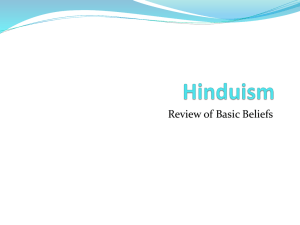Upanishads About the Document Vedas
advertisement
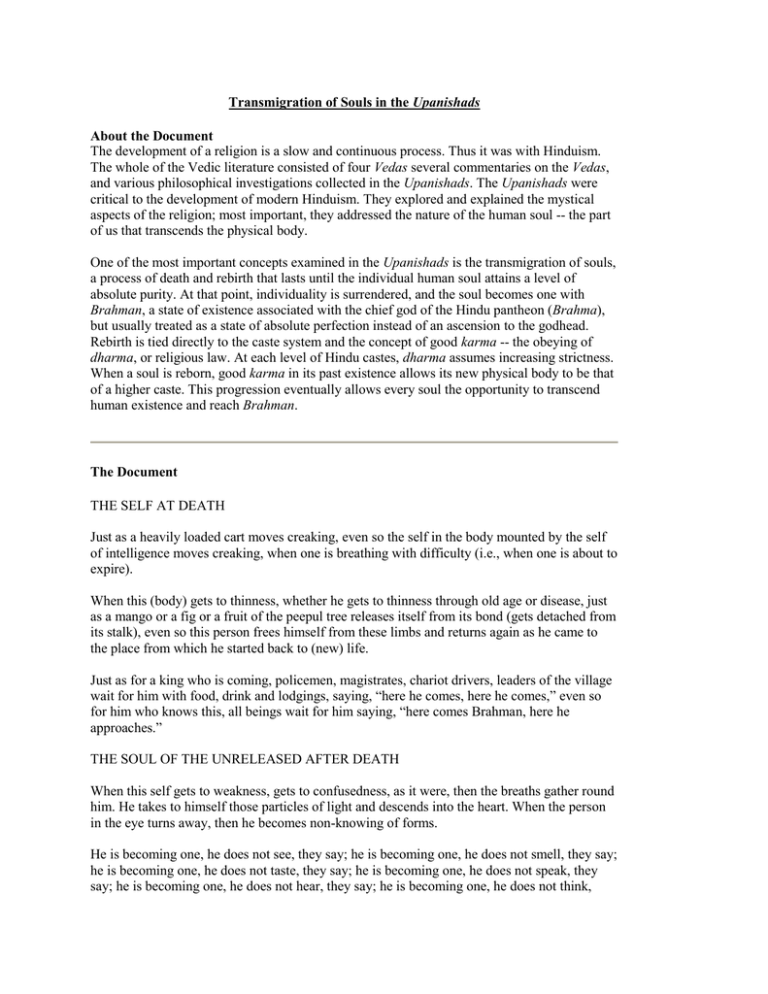
Transmigration of Souls in the Upanishads About the Document The development of a religion is a slow and continuous process. Thus it was with Hinduism. The whole of the Vedic literature consisted of four Vedas several commentaries on the Vedas, and various philosophical investigations collected in the Upanishads. The Upanishads were critical to the development of modern Hinduism. They explored and explained the mystical aspects of the religion; most important, they addressed the nature of the human soul -- the part of us that transcends the physical body. One of the most important concepts examined in the Upanishads is the transmigration of souls, a process of death and rebirth that lasts until the individual human soul attains a level of absolute purity. At that point, individuality is surrendered, and the soul becomes one with Brahman, a state of existence associated with the chief god of the Hindu pantheon (Brahma), but usually treated as a state of absolute perfection instead of an ascension to the godhead. Rebirth is tied directly to the caste system and the concept of good karma -- the obeying of dharma, or religious law. At each level of Hindu castes, dharma assumes increasing strictness. When a soul is reborn, good karma in its past existence allows its new physical body to be that of a higher caste. This progression eventually allows every soul the opportunity to transcend human existence and reach Brahman. The Document THE SELF AT DEATH Just as a heavily loaded cart moves creaking, even so the self in the body mounted by the self of intelligence moves creaking, when one is breathing with difficulty (i.e., when one is about to expire). When this (body) gets to thinness, whether he gets to thinness through old age or disease, just as a mango or a fig or a fruit of the peepul tree releases itself from its bond (gets detached from its stalk), even so this person frees himself from these limbs and returns again as he came to the place from which he started back to (new) life. Just as for a king who is coming, policemen, magistrates, chariot drivers, leaders of the village wait for him with food, drink and lodgings, saying, “here he comes, here he comes,” even so for him who knows this, all beings wait for him saying, “here comes Brahman, here he approaches.” THE SOUL OF THE UNRELEASED AFTER DEATH When this self gets to weakness, gets to confusedness, as it were, then the breaths gather round him. He takes to himself those particles of light and descends into the heart. When the person in the eye turns away, then he becomes non-knowing of forms. He is becoming one, he does not see, they say; he is becoming one, he does not smell, they say; he is becoming one, he does not taste, they say; he is becoming one, he does not speak, they say; he is becoming one, he does not hear, they say; he is becoming one, he does not think, they say; he is becoming one, he does not touch, they say; he is becoming one, he does not know, they say. The point of his heart becomes lighted up and by that light the self departs either through the eye or through the head or through other apertures of the body. And when he thus departs, life departs after it. And when life thus departs, all the vital breaths depart after it. He becomes one with intelligence. What has intelligence departs with him. His knowledge and his work take hold of him as also his past experience. Just as a leech (or caterpillar) when it has come to the end of a blade of grass, after having made another approach (to another blade) draws itself together towards it, so does this self, after having thrown away this body, and dispelled ignorance, after having another approach (to another body) draw itself together (for making the transition to another body). And as a goldsmith, taking a piece of gold turns it into another, newer and more beautiful shape, even so does this self, after having thrown away this body and dispelled its ignorance, make unto himself another, newer and more beautiful shape like that of the fathers or of the gandharvas, or of the gods or of Praja-pati or of Brahma or of other beings. That self is, indeed, Brahman, consisting of (or identified with) the understanding, mind, life, sight, hearing, earth, water, air, ether, light and no light, desire and absence of desire, anger and absence of anger, righteousness and absence or righteousness and all things. This is what is meant by saying, (it) consists of this (what is perceived), consists of that (what is inferred). According as one acts, according as one behaves, so does he become. The doer of good becomes good, the doer of evil becomes evil. One becomes virtuous by virtuous action, bad by bad action. Others, however, say that a person consists of desires. As is his desire so is his will; as is his will, so is the deed he does, whatever deed he does, that he attains. On this there is the following verse: "The object to which the mind is attached, the subtle self goes together with the deed, being attached to it alone. Exhausting the results of whatever works he did in this world he comes again from that world, to this world for (fresh) work." This (is for) the man who desires. But the man who does not desire, he who is without desire, who is freed from desire, whose desire is satisfied, whose desire is the self; his breaths do not depart. Being Brahman he goes to Brahman. On this there is the following verse: "When all the desires that dwell in the heart are cast away, then does the mortal become immortal, then he attains Brahman here (in this very body)." Just as the slough of a snake lies on an anthill, dead, cast off, even so lies this body. But this disembodied, immortal life is Brahman only, is light indeed, Your Majesty. "I give you, Venerable Sir, a thousand cows," said Janaka (King) of Videha. DESIRE THE CAUSE OF REBIRTH He knows that supreme abode of Brahman, wherein founded, the world shines brightly. The wise men, who, free from desires, worship the Person, pass beyond the seed (of rebirth). He who entertains desires, thinking of them, is born (again) here and there on account of his desires. But of him who has his desire fully satisfied, who is a perfected soul, all his desires vanish even here (on earth). This self cannot be attained by instruction nor by intellectual power nor even through much hearing. He is to be attained by the one whom (the self) chooses. To such a one the self reveals his own nature. This self cannot be attained by one without strength nor through heedlessness nor through austerity without an aim. But he who strives by these means, if he is a knower, this self of his enters the abode of Brahman. THE NATURE OF LIBERATION Having attained Him, the seers (who are) satisfied with their knowledge (who are) perfected souls, free from passion, tranquil, having attained the omnipresent (self) on all sides, those wise, with concentrated minds, enter into the All itself. The ascetics who have ascertained well the meaning of the Vedanta knowledge, who have purified their natures through the path of renunciation, they (dwelling) in the worlds of Brahma, at the end of time, being one with the immortal, are all liberated. Gone are the fifteen parts to their (respective) supports (the elements) and all the gods (the sense organs) into their corresponding deities. One’s deeds and the self, consisting of understanding, all become one in the Supreme Immutable Being. Just as the flowing rivers disappear in the ocean casting off name and shape, even so the knower, freed from name and shape, attains to the divine person, higher than the high. See Praśna VI. 5. Source: The Upanishads, in The Principal Upanisads, ed. S. Radhakrishanan (Boston: Unwin Hyman, 1953), pp. 268-73, 689-91. Analysis Questions 1. Compare the concept of Brahman to descriptions of "heaven" in other religions with which you are familiar. 2. Discuss the concept of "desire" and its relationship to rebirth. 3. Discuss the concept of Brahman. 4. What does the concept of transmigration of souls reveal about the human need for religions? 5. What is the central theme of these passages from the Upanishads?
